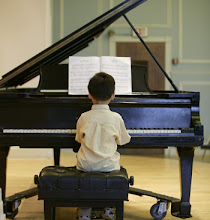 |
| Guitar faculty Mark Forchic coaching several saxophone students |
Spring brought a staggering number of performances throughout the community by ensembles from all of these branches. The list includes:
- regular performances at the City Line Landmark Americana
- a Jazz Festival on April 7 at the Mary Louise Curtis Band, in collaboration with professor Chris Farr from the University of the Arts and members of the UArts Jazz Band and with ensembles from all branches taking part
- a jazz-centered performance hour at the Wynnefield Branch
- a patio performance at the Free Library of Philadelphia's Wynnefield Branch, with piano faculty Scott Coulter joining several members of the Wynnefield Jazz Ensemble
- the South Street Spring Festival, sponsored by the South Street Headhouse District, with a crowd of thousands passing by
- the City Avenue Spring Fling. Saxophonist Jack Savone, a member of the Kardon-Northeast Jazz Ensemble, was even asked to sit in with Chico's Vibe, a professional group that performs widely throughout the Philadelphia area
 |
| Outdoor performance at the Free Library of Philadelphia's Wynnefield Branch |
These numerous performances are partly a reflection of the dedication of guitar faculty Mark Forchic, who coaches the ensembles at Wynnefield, Kardon-Northeast and Germantown. Along with the directors at those branches, he sought out new students at many local schools, and he's instilled a serious, performance-oriented mindset in all of his groups this year. "I treat it like we're a working, performing jazz group." Weekly practice sessions are "not like in school; we play like we are going out to play a gig -- which we do."
All these gigs wouldn't have come about with a talented bunch of students. One of Forchic's ensembles at Wynnefield started this year ahead of the rest -- the members are all students at Lower Merion High School and have been playing together for years -- and played the majority of the concerts. Forchic says those students -- Tom Hagen, Dean Hughart, Ellis Kelsey, Jeremy Katz, and John Della Franco -- are a special group. "It's unique from the other groups I have," he says. "I've had them for two or three years now, and they spend so much time playing and just hanging out together."
The ensembles at Kardon-Northeast and Germantown, plus the other two ensembles at Wynnefield, have all worked on catching up with the older, more experienced ensemble, and all have been featured during this busy season of shows. All of Forchic's groups dig deep into classic tunes, drawing from the professional jazz player's standby The Real Book, and work on making up arrangements on the spot -- no writing anything down.
The busy season is coming to a close with a performance at the Seger Park Playground Spring Festival on June 2 and numerous performances school-wide during the Open House on June 8. After a little downtime for students and faculty, jazz at Settlement will pick back up once again with the Summer Jazz Camp from July 29 to August 2. For more information on the jazz ensemble program at Settlement, contact the Branch nearest you or stop by the Open House at any of our branches on June 8 from 10 AM to 1 PM.









